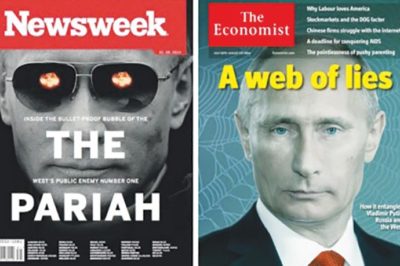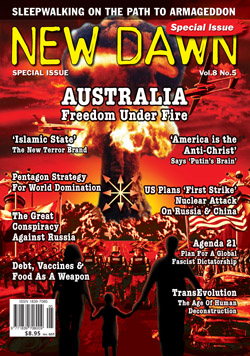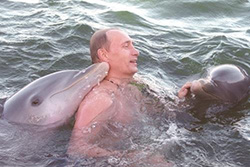From New Dawn Special Issue Vol 8 No 5 (Oct 2014)
When the war-drums start beating in Washington against a state or statesman, one is entitled to wonder what transgression might have been made against the ‘New World Order’. Over the past few decades we have seen one nation after another succumb to either financial blandishments, or when those fail, long-planned, well-funded ‘spontaneous’ colour revolutions, and as a last resort bombs. The states of the ex-Soviet bloc largely succumbed to ‘colour revolutions’ orchestrated by the Soros network, aligned with the National Endowment for Democracy (NED), USAID and a host of other funds and NGOs.
Milosevic’s Serbia, Qadhafi’s Libya and Saddam’s Iraq were bombed into submission, with ground support for jihadists. The globalists have no objection to jihadists when they serve to keep the world in a state of ‘constant conflict’, in accordance with globalist aims. The USA will use ‘Islamists’ where they can, both as dupes and bogeymen.
There is one major spanner in the world: Russia – again. Russian President Vladimir Putin has been vilified relentlessly from the start of his leadership of Russia. A second ‘Cold War’ followed so soon in the aftermath of the first that the two can be regarded as one.
Russia Stymied World State
There was a fleeting interregnum when it looked as though Russia would finally succumb to globalisation. This encompassed the Yeltsin years, however it was prepared while the Communist Party still held power, during the Gorbachev era. The sudden implosion of the mighty Soviet edifice, seemingly overnight, was long prepared by a combination of US-based subversion, backing ‘dissidents’ such as Solidarity in Poland, coupled with a planned scuttle by Gorbachev, who envisioned himself as an internationally-feted globalist celebrity.
Russia had succumbed to the nexus of money and revolution in 1917. The revolutionary movement had been well funded since 1905 when the anti-Tsarist journalist George Kennan was sent over to Japan to propagandise Russian POWs, with funds from Jacob Schiff of Kuhn, Loeb & Co., Wall Street. Kennan remarked that 50,000 revolutionary cadres were sent back to Tsarist Russia. Schiff’s contribution to the overthrow of the Tsar was lauded in New York in March 1917.1 There quickly followed the Bolshevik coup led by Lenin and Trotsky. Lenin was backed by the Germans to get Russia out of the war, and Trotsky was backed by the Americans and British to keep Russia in the war. Trotsky was in close association with R. H. Bruce Lockhart, British War Cabinet special agent in Russia, to such an extent that Lockhart’s wife commented that many of his colleagues quipped he was turning Bolshevik. The lines were drawn when Trotsky resigned as minister of foreign affairs because of Lenin’s insistence that Russia sign an armistice with Germany.2
After the war, there was a scramble by international finance to get concessions from the Soviets, at a time when their existence was very precarious at best, and the American ‘intervention’ under General Graves was doing its best to backstab the White Armies in favour of the Reds.3 H. Wickham Steed, editor of The London Times, observed at the Paris Peace Conference that it was the international financiers such as Schiff who were pushing for worldwide recognition of the Bolsheviks.4 Matters proceeded well for international capitalism under the regime of Lenin and Trotsky. Russia opened up to foreign capital and technology. With Lenin’s death and the resulting power struggle, Stalin eliminated the influence of Trotsky and his coterie in 1928.
The common fight against the Axis in the Second World War opened up a further opportunity for the USSR to be brought into a world order. The USA proposed such a world state via the United Nations General Assembly as a world parliament. The USSR recognised that the USA would control any such parliamentary vote, and insisted that authority be vested in the Security Council with the right of veto for permanent members. The second premise for a post-war new world order rested with the US proposal to ‘internationalise’ atomic energy under United Nations aegis, outlined in the ‘Baruch Plan’, named after Bernard M. Baruch, so-called ‘elder statesman’ of the USA. Again, the USSR said no.5
The USSR alone prevented the creation of a world state. The conservative Right remains confused about Russia till today, and much of it continues the old Cold War anti-Russia line against Putin who, to them, is the new Stalin.
How the Soviet Bloc Imploded
While the globalists opportunity to erect a world state in the name of ‘world peace’ after the defeat of the Axis was scuttled by the USSR, the implosion of the Soviet bloc provided another opportunity. The oligarchs in the West are so conceited that they assume the whole world yearns for the ‘freedom’ of their ‘Brave New World’, in a narcosis of production and consumption. They assumed that with the demise of the Soviet Union they would be linking with their counterparts in Russia to form an international exploitative regime. Mikhail Gorbachev was their man, as Lenin and Trotsky had been.
Gorbachev has indeed become part of the globalist elite, as indicated by the 2011 celebration of his 80th birthday at the Royal Albert Hall, London, where “movie stars, singers and politicians showed up, underlining the celebrity status Mr Gorbachev enjoys in the West where he is widely perceived as the man who freed Eastern European from Soviet rule and ended the Cold War.”6 Guests included Lech Walesa, father of post-Soviet Poland, whose Solidarity movement received largesse from the National Endowment for Democracy (NED), CNN founders Ted Turner, Israeli President Shimon Peres, and unnamed “oligarchs.”
On his birthday, Gorbachev warned Putin not to seek a third presidential term and menacingly referred to the revolts in the Arab world.
Back in 1988 Gorbachev openly invited revolt in the Soviet states by declaring before the United Nations that the USSR would not defend their Eastern bloc colleagues. This was the year that the Soviets pulled out of Afghanistan, ‘Russia’s Vietnam’. He also announced there would be a massive reduction of Soviet armed forces from the Eastern bloc states.7 Gorbachev stated to his advisors his commitment to a “new world” under the auspices of the United Nations Organisation.8 The groundwork had been laid previously, with the sponsoring of Solidarity in Poland, which Carl Gershman, head of the National Endowment for Democracy (NED), stated set in motion the “velvet revolutions” that toppled the Warsaw Pact bloc.9 The NED contrived Polish-Czech-Slovak Solidarity Foundation supported dissident publishing in the Czech Republic, Slovakia, the Ukraine, Belarus, Russia, Moldova, the Caucasus and Central Asia. The Foundation for Education for Democracy, an outgrowth of the Solidarity Teachers Union, trained teachers and NGO leaders throughout the former Soviet Union, and the East European Democratic Center created dissident media in the Ukraine and Central Asia.10 The destruction of the Soviet bloc was orchestrated by a combination of Gorbachev’s treachery, globalist funded subversion, and the US sponsored Afghanistan imbroglio.
In 1991 Gorbachev established the International Foundation for Socio-Economic and Political Studies to add his input to the dazzling array of interconnected globalist NGOs, foundations and think tanks. The North American branch founded in 1997 states the purpose is to spread “economic liberalisation.”11
“Wrong Direction”
Throughout the 1990s things seemed to be going well for the globalists. Russia had at last been deconstructed, and was ready for bringing into the ‘New World Order’. Gorbachev gave the green light for the dismantling of the Eastern bloc, and paved the way for idiot democracies of the Westminster style. Appropriately a drunken buffoon, Boris Yeltsin, who started his climb to power under Gorbachev in 1985 as a member of the Politburo, Mayor of Moscow and other senior posts, was offered up to usher in the new democratic Russia that could take her place in the world as another colony of finance-capitalism. He had earned his credentials as a liberal when criticising the lack of haste in reform in 1987. The first democratically elected president of Russia, he lasted from 1991-1999. Under Yeltsin Russian assets were sold off at knock down prices to oligarchs in the name of economic liberalisation. From the start of his presidency Yeltsin brought in advisors from the IMF, World Bank and US Treasury. His 1996 presidential campaign was funded by the oligarchy and promoted by their controlled media. Boris Berezovsky was described by a Council on Foreign Relations (CFR) analyst, Daniel Treisman (who served in a 1997 US team in Russia on tax reform), as the “godfather of godfathers,” the oligarch who sat at the top of the dung-heap.12
Having devastated Russia, Yeltsin resigned, begging Russians for forgiveness for the ruin he had brought. The presidency was assumed by Prime Minister Vladimir Putin in December 1999. It was anticipated that Putin would continue to allow Russia to be vampirised, but he took what the globalists have ever since been calling a “wrong direction,” the title of a Council on Foreign Relations position paper “Russia’s wrong direction.” Written in 2006, the CFR paper recommended increased funding for the Freedom Support Act, in this instance referring specifically to the 2007-2008 presidential elections. Authors of the CFR report included Jack Kemp, Republican Party politico; Mark F. Brzezinski, who served on the National Security Council as an advisor on Russian and Eurasian affairs under President Clinton, as his father Zbigniew had served in the Carter Administration; Antonia W. Bouis, founding executive director of the Soros Foundations; James A. Harmon, senior advisor to the Rothschild Group, et al.13
While Putin has been criticised for associating with a coterie of oligarchs of his own, these businessmen have been incorporated into the strengthening of the Russian state, not its undermining for globalist interests. Those who acted otherwise have been purged, and are celebrated as ‘dissidents’ and champions of ‘human rights’ by anti-Russia interests. These include the ‘godfather of oligarchy’ Berezovsky, who was living in exile in England where he was found hung,14 and Mikhail Khodorkovsky (hailed as a hero in the West), onetime owner of Yukos, jailed for ten years, while his oil empire was taken back for Russia. His son Pavel heads the Institute of Modern Russia to continue the work of his father’s Open Russia Foundation to promote “Russia’s integration into the community of democracies,”15 which is to say, Russia’s subordination to international finance.
In particular, Putin has challenged the notion of “the New American Century” as one prominent think tank optimistically termed the 21st century. Putin has moved to limit the influence of the same subversive networks that undermined the Eastern bloc via ‘velvet revolutions’ by obliging employees of NGOs to register as ‘foreign agents’, and the state started an investigation of these subversives in March 2013. In that year NED provided $8,226,487 to NGOs, programmes and seminars in Russia for the undermining of the state in the name of “human rights.”16 NED receives funding from US Congress. Imagine the outrage of ‘world opinion’ if Russia funded groups to undermine the US government. Added to this are the millions that have poured in to undermine Russia by the George Soros network, USAID, and a host of others. In 2012 Putin expelled USAID, a governmental agency, stating that it was undermining Russia’s sovereignty.
Geopolitically, the globalists aim to encircle Russia. The alliances created by Putin in central Asia and further afield have meant this has not entirely succeeded, with the Shanghai Cooperation Organisation including China, Kazakhstan, Kyrgyzstan, Tajikistan and Uzbekistan; and with India, Iran, Mongolia and Pakistan having observer status. Belarus and Sri Lanka are dialogue partners, and Turkmenistan has guest attendance.
However, states such as Georgia and the Ukraine are targeted for takeover as important elements in this strategy. NED avidly sponsored young cadres in various sectors of Ukrainian society, including ‘educating’ electorates on how to vote in the October 2012 elections. The 2012 NED financial report lists the NGOs in the Ukraine that received $3,380,834 during that year.17 The amount represents the upper end of funds sent by NED throughout the world.
Pro-Moscow separatists in eastern Ukraine who would in other circumstances be lauded by the world media and politicians as ‘freedom fighters’, have been characterised as ‘terrorists’. The enemies of Russia have through the most illogical of rhetoric charged the Russian president with being personally responsible for the downing of a Malaysian airliner. The only thing known for sure as this is written is that Russian interests were in no way served by the targeting of the airliner, but it serves as grist for the anti-Russian agenda. Russia in turn is being pushed further from Europe, and into the embrace of China.
The Russians remain one of the few residues of a tough people still relatively uncorrupted by the moral, cultural and spiritual rot of a West in its epoch of death. With Russia there are still at least possibilities. “The Russian people are the people of the future,” wrote the philosopher Nikolai Berdyaev. “They will decide questions which the people of the West has not yet the strength to decide, which it does not even pose in their full depth.”18
Gain a deeper understanding of the conflict between Putin’s Russia and the West. Check out all the articles in New Dawn Special Issue Vol 8 No 5.
FOOTNOTES
1. K. R. Bolton, Revolution from Above, Arktos Media Ltd., 2011, 57-58
2, K. R. Bolton, Stalin: The Enduring Legacy, Black House Publishing, 2012, 104-106
3. K. R. Bolton, Revolution from Above, op. cit., 66-97
4. Ibid., 61-62
5. K. R. Bolton, Stalin, op. cit., 125-134
6. Reuters, ABC News, ‘Stars honour Gorbachev at gala birthday bash’, 31 March 2011, www.abc.net.au/news/stories/2011/03/31/3178823.htm
7. Dr. Svetlana Savranskaya and Thomas Blanton (ed.), ‘Previously Secret Documents from Soviet and U.S. Files n the 1988 Summit in New York, 20 Years Later’, National Security Archive Electronic Briefing Book No. 261, 8 December 2008
8. M. Gorbachev, ‘What are we going to take to the United Nations?’, Conference with advisors, 31 October 1988, Attended: Shevardnadze, Yakovlev, Dobrynin, Falin, Chernyaev, Archive of the Gorbachev Foundation. Fond 2. Notes of A.S. Chernyaev. On file at the National Security Archive. Translated by Svetlana Savranskaya. www.gwu.edu/~nsarchiv/NSAEBB/NSAEBB261/sov03.pdf
9. C. Gershman, ‘Giving Solidarity to the world’, Georgetown University, 19 May 2009, www.ned.org/about/board/meet-our-president/archived-remarks-and-presentations/051909
10. C. Gershman, ‘Giving Solidarity to the world’, Ibid
11. The Gorbachev Foundation of North America, ‘Mission’, www.gfna.net/staff.php
12. Daniel Treisman, ‘Blaming Russia First’, Foreign Affairs, Council on Foreign Relations, November/December 2000, www.foreignaffairs.com/articles/56649/daniel-treisman/blaming-russia-first
13. Jack Kemp, et al, ‘Russia’s Wrong Direction: What the United States Can and Should Do’, Independent Task Force Report no. 57, Council on Foreign Relations, 2006, xi. The entire publication can be downloaded at: www.cfr.org/publication/9997/
14. Ian Cobain, ‘Boris Berezovsky inquest returns open verdict on death’, The Guardian, 27 March 2014, www.theguardian.com/world/2014/mar/27/boris-berezovsky-inquest-open-verdict-death
15. ‘Russia : A Postmodern Dictatorship?’, NED forum, 2013, www.ned.org/events/russia-a-postmodern-dictatorship
16. ‘Russia’, 2013 NED Annual Report, www.ned.org/where-we-work/eurasia/russia
17. National Endowment for Democracy, NED 2012 Annual report, www.ned.org/where-we-work/eurasia/ukraine
18. Nikolai Berdyaev, The Russian Idea, Macmillan, 1948, 70
© New Dawn Magazine and the respective author.
For our reproduction notice, click here.





